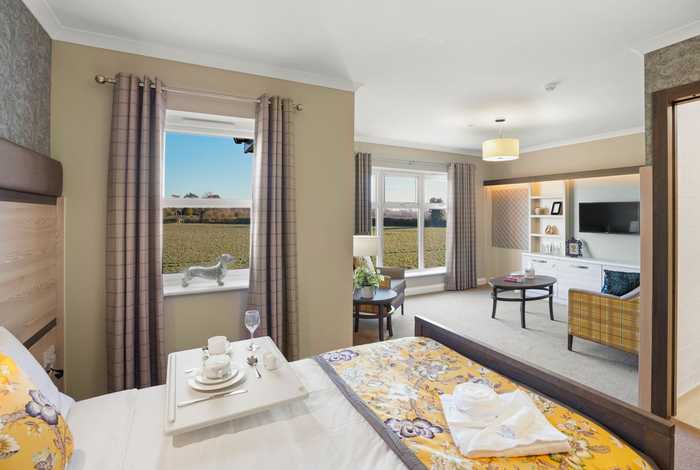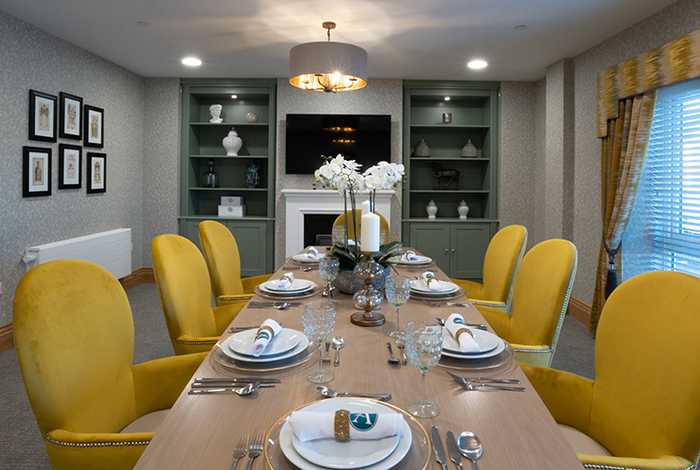Posted by Janine Griffiths
Top Mistakes to Avoid When Moving into a Care Home

Moving into a care home marks the start of a new chapter of your life - one that requires careful thought and planning. It’s not just about finding a place to live—it’s about ensuring that the care, environment, and services align with your needs and preferences. Poor planning or rushing into a decision can lead to unnecessary stress, financial strain, or dissatisfaction with the chosen facility.
This guide aims to highlight common mistakes people make during this transition and provide actionable advice on how to avoid them. By being well-informed and proactive, you can ensure a smoother, more positive move into a care home.
Common mistakes associated with moving into a care home
Below, we have listed the most common mistakes associated with moving into a care home. Avoiding these pitfalls will make it more likely that your move will be a successful one.
Not researching enough options
When it comes to choosing a care home, one of the most common mistakes is settling on the first option without thoroughly exploring alternatives. This often happens due to time constraints, emotional pressure, or the assumption that all care homes offer similar standards of care. However, care homes can vary greatly in terms of services, amenities, and atmosphere. Failing to explore multiple options can result in a poor match, which might not meet your needs or preferences.
The consequences of insufficient research can be significant. Choosing a care home that doesn’t align with your requirements can lead to dissatisfaction, a lack of appropriate care, or even a need to move again in the future. For example, the home may not provide the specialised care required for certain medical conditions or may lack the activities and amenities that promote wellbeing. Additionally, selecting a poorly located care home can make it difficult for family and friends to visit regularly, potentially leading to feelings of isolation.
To avoid this mistake, it’s crucial to invest time in researching and comparing care homes. Start by looking up online reviews, ratings, and inspection reports to assess the quality of care provided. Visiting multiple facilities is equally important, as it allows you to observe the environment, interact with staff, and get a sense of the community. Pay close attention to factors such as cleanliness, the attitude of staff, and the activities on offer. You should also consider the care home’s location, ensuring it is accessible for loved ones to visit frequently.
Autumna has made the entire process of researching care homes much easier through our online platform. All you have to do is select the type of care you need, enter your location and then view a list of prospective care homes in your area. Our shortlisting tool can also curate a list of care homes for you.
Ignoring financial planning
One of the most common mistakes when arranging care is underestimating the costs involved or failing to plan for long-term expenses. Care services can be expensive, and without careful financial planning, you may face significant financial strain. This lack of preparation can lead to unexpected challenges, such as needing to move to a less costly care option or compromising on the quality of care due to affordability issues.
To avoid these pitfalls, it is essential to understand the full scope of costs associated with care. Beyond the base fees, there are often additional charges for specific services, deposits, or annual increases in rates that can add up over time. Taking the time to research and calculate these expenses thoroughly ensures there are no unwelcome surprises down the line.
It is also worth noting that you may potentially be eligible for financial support from local authorities or benefits like Attendance Allowance, but these resources are often overlooked. Additionally, personal savings, pensions, and other assets can be structured to help fund care sustainably. Seeking advice from financial advisers who specialise in later life care can make a significant difference. These experts can provide tailored guidance on managing assets, exploring options available to you, and ensuring long-term affordability without compromising on care quality.
By prioritising financial planning early in the process, you can avoid unnecessary stress, secure better care options, and maintain financial stability for the future.
Overlooking personal needs and preferences
Choosing a care home that does not align with your personal lifestyle or health requirements is a mistake that can significantly impact your quality of life. Everyone has unique needs and preferences, and overlooking these can lead to feelings of dissatisfaction, isolation, or even inadequate care. The right care home should feel like a home away from home, offering the support and environment that ensures comfort and well-being.
The consequences of selecting a care home that doesn’t cater to specific needs can be profound. For example, it may lead you to struggle with unmet care requirements, such as insufficient nursing or dementia support, or experience a decline in mental and emotional well-being if the environment fails to accommodate your lifestyle preferences. Social activities, dietary options, and even room type can play a pivotal role in ensuring a positive experience.
To avoid this, it’s essential to create a detailed checklist of personal preferences and requirements. Consider factors such as the type of room (single, double, ensuite et cetera), availability of social activities, and dietary requirements. Beyond lifestyle needs, ensure the care home offers the appropriate level of support for health conditions, whether that involves nursing care, dementia care, or specialist services. Taking the time to match a care home’s offerings with your needs will help ensure you thrive in your new environment.
By focusing on personal needs and preferences, you can make more informed decisions, leading to a happier, healthier, and more fulfilling experience.
Skipping the transition planning
Rushing a move into a care home without proper emotional or practical preparation can lead to significant stress and anxiety. The transition to a new living environment is a major life change, and without adequate planning, it can feel overwhelming and disruptive. This lack of preparation often results in feelings of resistance or unease, making it harder for you to settle into new surroundings.
To ensure a smoother transition, it’s crucial to take a gradual approach. Arranging smaller visits or trial stays can help you to become familiar with the environment and staff, reducing the fear of the unknown. Open and honest discussions about the move are also important, as it gives you a chance to express any concerns and feel heard throughout the process. Personalising your new space can create a sense of ownership and make you feel more at home. Thoughtful transition planning can ease anxieties and lay the foundation for a positive start in the care home.
To help guide you through this process, Autumna has produced a number of blogs that outline ways you can prepare for a move into a care or nursing home. Check out the following articles:
Who to inform before moving into a care home
Ultimate guide to moving into a new nursing home
How to Manage a Discharge from Hospital into Care Homes
Financial planning for moving into a care home
Failing to read contracts thoroughly
Overlooking the terms and conditions of a care home agreement is a common mistake that can lead to misunderstandings about fees, services, or your rights. Care home contracts are often detailed and complex, covering everything from payment structures to rules on visitor policies and termination clauses. Failing to thoroughly review these terms can result in unexpected charges or conflicts down the line.
To avoid such issues, take the time to carefully read and understand the contract before signing. Pay close attention to the fees, notice periods, and any additional costs that might arise. If any terms are unclear, don’t hesitate to ask questions or request clarification from the care home management. In cases where the agreement seems overly complicated or concerning, seek legal advice to ensure you fully understand your rights and obligations. Being diligent with the contract review process protects you from surprises and ensures a transparent and smooth relationship with the care home.
Overlooking location, accessibility, and communication
When choosing a care home, you should not overlook the importance of location and accessibility. A care home that is close to family and friends makes it easier to maintain regular visits and connections. If the location is difficult to reach, you may find it harder to stay engaged, which can lead to reduced contact and feelings of isolation. Accessibility to medical facilities and essential services is also critical, especially if you require frequent medical appointments or support.
It’s important to consider your mobility and transportation needs. The care home should be easy to navigate, with appropriate facilities to accommodate your mobility. Additionally, check if there are reliable transport options available for accessing appointments, social activities, or nearby amenities. Limited accessibility can restrict your ability to stay active and engaged in daily life.
Don’t assume the care home will automatically meet all your communication needs. Take the time to maintain open communication with the care staff to ensure your concerns, preferences, and well-being are addressed. By prioritising location, accessibility, and communication, you can create a more positive and connected experience in a care home.
Looking for a care home?
Autumna’s online platform makes the process of shortlisting care homes easy. You can also answer a few quick questions on our shortlisting tool to receive suggestions more closely aligned to your circumstances. Alternatively, you can speak to our knowledgeable and friendly care team on 01892 335 330.
Receive a Free Care Home Shortlist!
Let our expert team of advisers get your search off to a great start.
Tell us a little about your needs and we'll send you a bespoke shortlist of care homes! Click the button below to begin, it takes just a few minutes.
Other articles to read
From the blog

Older Persons Care Advice
Ultimate guide to care homes in Norwich
April 23rd, 2025
Discover the best care homes in Norwich—explore lifestyle-focused options, top-rated services, and how to choose the right home with confidence.

Older Persons Care Advice
How to find an adult day care centre near you
April 22nd, 2025
Looking for an adult day care centre near you? Discover how to find safe, joyful care for your loved one—and support for yourself—on Autumna.

Older Persons Care Advice
How to shortlist care homes in Exeter
April 17th, 2025
Need help shortlisting care homes in Exeter? Learn how to filter options with confidence, compare homes, and find the best fit with Autumna’s free tools.
Frequently Asked Questions
Yes, most care homes encourage residents to bring personal belongings to help create a familiar and comfortable environment. Items like photographs, decorations, or small pieces of furniture can make your new space feel more like home. Check with the care home about any size or safety restrictions.
Some care homes allow residents to bring pets, while others may not due to health and safety regulations. If keeping your pet is important to you, look for pet-friendly care homes or ask if alternative arrangements, like pet visits, can be made.
Care homes often offer a variety of activities, such as exercise classes, arts and crafts, social events, and outings. Be sure to ask about the types of activities provided and whether they align with your interests and abilities to ensure you stay engaged and fulfilled.
The UK's largest & most detailed directory of elderly care and retirement living options
10,445
Care Homes
12,390
Home Care Services
1,671
Live-in Care Services
1,826
Retirement Living Developments
Autumna is the UK's largest and most comprehensive later-life living & elderly care directory. Our detailed search facility and team of expert advisors can help you find the best care homes, nursing homes, retirement homes, retirement villages, home care, and live-in care services for you or your loved one's needs. Our website is free to use, we are proudly independent, and we never take referral fees.






